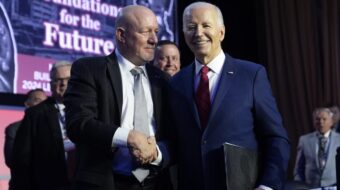WASHINGTON -The Coalition of Labor Union Women and a wide range of other women’s groups – from the YWCA to the National Women’s Law Center – are banding together in a joint alliance, called HerVotes, to push their issues to the fore in the 2012 election campaign, and to protect women’s rights.
But even before the groups start the election drive, they’re campaigning to ensure federal jobless benefits are extended again, lest they run out at the end of this year. Expiration would disproportionately hurt women, alliance members said.
“All the activity that is being generated that HerVotes (and CLUW) has been involved in about unemployment insurance extension,” said CLUW Executive Director Carol Rosenblatt. CLUW President Karen See and Rosenblatt attended the Dec. 9 alliance meeting where the groups discussed joint efforts and strategy.
As part of the unemployment insurance drive, CLUW also wrote lawmakers urging they preserve the program at its present length: Up to 99 weeks of total state and federal jobless benefits. CLUW’s letter to lawmakers urged them to oppose a GOP plan to cut the overall jobless aid by up to 40 weeks.
“Our top legislative priority is to ensure a robust and clean continuation of federal unemployment insurance programs throughout all of next year,” CLUW wrote.
“Families are suffering in this difficult job market. We hear from our members every day that their families will face disaster if the crucial safety net of federal unemployment insurance is cut,” CLUW said.
After the jobless benefits fight ends, alliance members will launch their wider HerVotes campaign in January. They want to ensure women’s voices are heard on the campaign trail, and their votes – 53 percent of the electorate – are heeded. That applies to both parties, speakers emphasized.
“The idea is to make advances for women a major part of the political dialogue. They’re at risk right now, and I’m not just talking about reproductive rights,” said veteran activist Eleanor Smeal of the Feminist Majority.
The alliance plans to raise specific issues on the campaign trail, have its local affiliates work together to put pressure on politicians nationwide, get political pledges of commitment on women’s issues – and hold the pols to them – and to make it clear that the issues involved will decide women’s votes next November.
Their model is what happened in Mississippi, members said, where the groups came together in one wide-ranging statewide coalition to oppose a right wing constitutional amendment stating life begins at fertilization. That would have outlawed not just abortion, but contraception and all other reproductive rights. The coalition started at least 40 percentage points behind in polls, but phone banking, Internet communications and leafleting produced a 12-percentage-point win on Nov. 8.
Nevertheless, the alliance has its work cut out for it, politically. The Obama administration is concentrating on the economy, in general, and the GOP hopefuls, with the exception of reproductive rights, ignore women’s issues altogether.
“We’re losing a lot of jobs” as state and local governments slash budgets and workforces, See said. “And many workers can’t strike” even when state and local pols cut their pay and pensions, raise their health care costs, and kill collective bargaining.
“Cuts in public services are a double whammy for women,” added Nancy Campbell of the National Women’s Law Center. “Women are a majority among state workers, and are 66 percent of the 600,000” state workers let go in recent months. “And since women are highly dependent on the services states provide, they’re more economically vulnerable” to public service cuts.
A fact sheet from the group lists 10 top advances in women’s rights and interests, starting with the passage of the 19th amendment in 1920, which gave women the right to vote, that are now threatened. “Voter ID requirements” in 30 states “target students, people of color and women” and “are attempting to turn the clock back to the 19th century, when only privileged white males were allowed to vote,” the fact sheet adds.
Smeal said the voter ID requirements are particularly threatening to older women, especially minority women, many of whom lack the documentation – such as birth certificates – that the ID laws now require in order to register to vote.
The other threatened women’s advances are Social Security, the Equal Pay Act of 1963, Medicare, Medicaid, the Title X National Family Planning Program of 1970, the Title IX Education Amendments of 1972, which outlaw discrimination in federally funded education programs or activities, the 1973 Supreme Court decision legalizing abortion, the 1994 Violence Against Women Act and President Obama’s health care law.
That law “covers maternity care, eliminates pre-existing conditions and prevents health plans from charging women more than men for the same coverage,” the fact sheet adds. “It also covers well-woman preventive health services,” but both the House GOP and various states would repeal all of its provisions.
“It’s not just health care and the economy, but we have to put a woman’s face” on all those issues, said Linda Hallman of the American Association of University Women. Her group convened the Dec. 9 meeting.
Campbell also said the uneven, and slow, economic recovery is a threat to women. She pointed out that since the “official” end of the Great Recession in July 2009, the economy has added 1.2 million male workers from the ranks of the unemployed. But the number of jobless women has increased by 46,000.
“And for single mothers, the jobless rate is 12.4 percent and for black women it’s 12.9 percent,” she said – far above the still-high national 8.6 percent jobless rate.
Other groups at the Dec. 9 meeting were the Black Women’s Roundtable, the YWCA, MomsRising.org, and the National Council of Jewish Women.

MOST POPULAR TODAY

‘Warning! This product supports genocide’: Michigan group aims to educate consumers

After months of denial, U.S. admits to running Ukraine biolabs

“Trail of Tears Walk” commemorates Native Americans’ forced removal

Hold the communism, please: SFMOMA’s Diego Rivera exhibit downplays artist’s radical politics







Comments